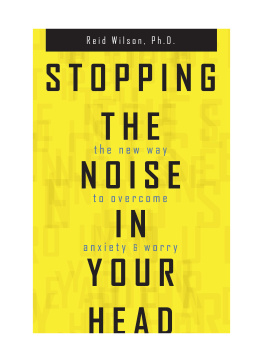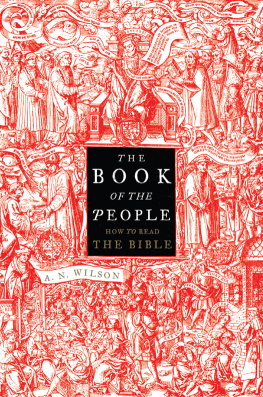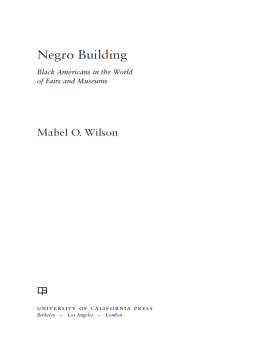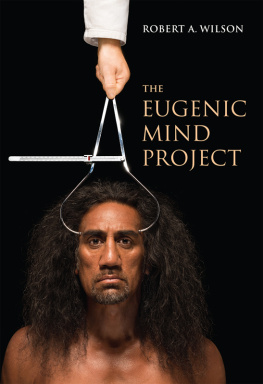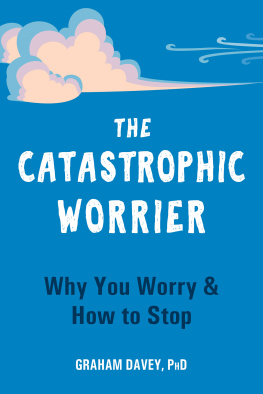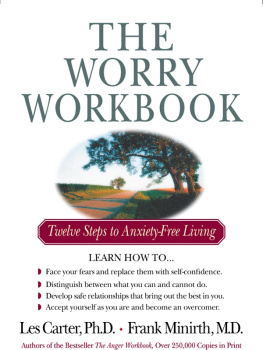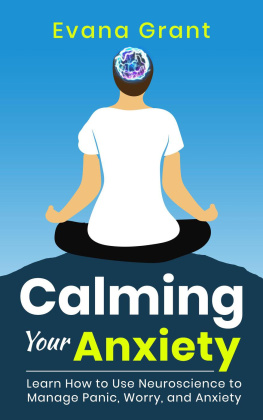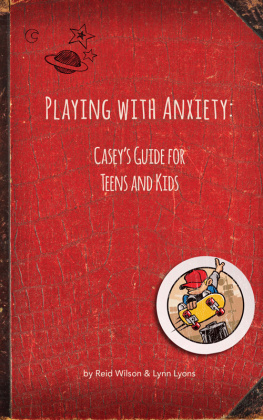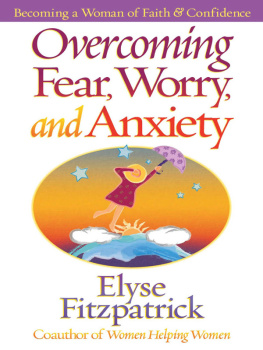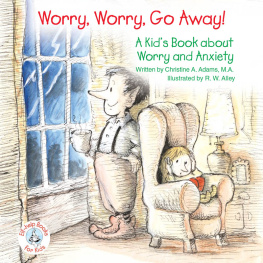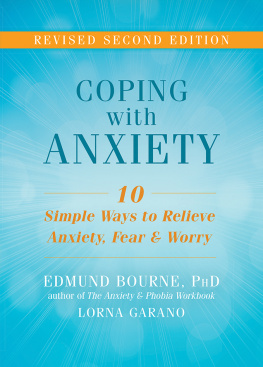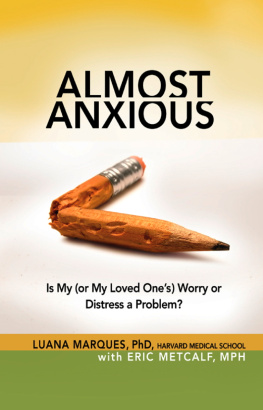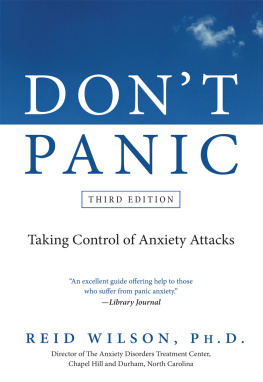STOPPING
THE NOISE IN
YOUR HEAD
The New Way to Overcome
Anxiety and Worry
REID WILSON, PHD
Health Communications, Inc.
Deerfield Beach, Florida
www.hcibooks.com
Scripture quotation taken from the Holy Bible, New International Version, NIV. Copyright 1973, 1984, 2011 by Biblica, Inc. Used by permission of Zondervan. All rights reserved worldwide. www.zondervan.com .
Library of Congress Cataloging-in-Publication Data
is available through the Library of Congress
2016 Reid Wilson, PhD
ISBN-13: 978-07573-1906-8 (Paperback)
ISBN-10: 07573-1906-8 (Paperback)
ISBN-13: 978-07573-1907-5 (ePub)
ISBN-10: 07573-1907-6 (ePub)
All rights reserved. Printed in the United States of America. No part of this publication may be reproduced, stored in a retrieval system, or transmitted in any form or by any means, electronic, mechanical, photocopying, recording, or otherwise, without the written permission of the publisher.
HCI, its logos, and marks are trademarks of Health Communications, Inc.
Publisher:
Health Communications, Inc.
3201 S.W. 15th Street
Deerfield Beach, FL 334428190
Cover design by Dane Wesolko
Interior design and formatting by Lawna Patterson Oldfield
Graphics by Jennifer Garman
ePub created by Dawn Von Strolley Grove
To Bentha

Contents
Where would we be without our worries? How would the dishes get done, children get fed, bills get paid? With all that we have going on in our lives, how would the floors get swept, homework get done, birthday cards get mailed on time? How would we get enough sleep each night unless we worried about not getting enough sleep?
Perhaps theres some truth in all that (save the bit about sleepingIm fairly certain worry wont help with that). Our worries serve a purpose in our daily lives. They arent just instruments of torture.
I imagine when you purchased this book you assumed that Im here to help you defeat and cast out your worries, to provide the tools you need to kick that worry addiction once and for all. But the truth is that worry and I have a love-hate relationship. Not unlike my relationship with chocolate-covered almonds (dark). Ive had to set some serious boundaries and limitations with these pleasures. The desire for almonds pops into my mind from time to time, and I have to respond. Look here, I say in a stern voice, there is a time and a place for chocolate-covered almonds (dark), and right now, in the middle of a conference in Austria, is neither the time nor the place.
When worry plays a role in helping us to solve our problems, it does a fantastic job. (Just like when the almond-to-dark-chocolate ratio is more like 3:1 than 1:1.) So I want you to love worry when it serves you. But when it becomes a bothersome noise in your head, it has no redeeming value and you need to kick it to the curb.
Two-Headed Worry
I have spent most of my thirty-five-year career working with anxious clients. When people ask what drew me to this field, one of my playful answers is, It takes one to treat one. And I guess thats right. Although I have never had an anxiety disorder, I sure know how to worry. In fact, I am skilled at generating lots of bad feelings alongside many wonderful feelings. I can distinctly remember a moment in college when I concluded that I was likely to be a lifelong expert at generating worrisome thoughts. I figured that the best way to keep track of my own mental health was to make psychology my profession.
Various resources helped produce the book youre holding in your handsinvestments such as time, research, years of study and practice, drafts, proposals, and perhaps 4,000 cups of various forms of caffeineand among all of those was worry . My worry shows up in one of two forms: either incredibly helpful... or dreadfully bothersome.
When I continually remind myself that I should be working on this project, and yet I dont set aside time to focus on it, I use up part of my consciousness fretting because Im not getting around to the task. I experience a combination of guilt (that Im not being productive enough) and worry (that I am making a mistake by not addressing the project at this very moment), both wrapped up in a tidy little package padded with a thick layer of self-criticism.
When the task is my writing, it sounds a bit like this: Geez, I gotta get focused on writing the book. I gotta be more efficient with my time. I gotta stop doing these little productive things and focus on the big productive stuff. And I gotta find a synonym for gotta. And then, If I dont devote time and energy to this, itll never get done. I waste so much time during the day. I need to start focusing. I should do all of these things today... simultaneously. This is not a loud noise in my head, mind you. Its more like a kind of muttering. It gnaws away at me in the background and brings a taste of unhappiness into my mental palette each day.
Heres the other way my worry works, and this I highly recommend. The thought pops up again: I gotta get back to working on the book if Im ever going to get it done. But this time its wired into my disposition about this project. Its important to me, I want to accomplish it, and I absolutely want to devote time in the immediate future to work on it. I can use that thought as a signal to move into action. Relatively quickly I shift into problem-solving mode: I decide when Im going to set aside a chunk of time, and I literally mark off that half day or so in my calendar.
Did you notice how I just said, Relatively quickly I shift into problem-solving mode? That happens on a really, really good day. Usually its somewhere between Youd better get back to work! and Ill mark off some time soon.
Granted, worry isnt the only way I get myself to work. Lucky for me, most of the time I feel inspired about my day. I have interesting projects that motivate me, and I can keep my attention focused on the positive outcomes I want from my creative efforts. (The caffeine helps too.)
But juggling and prioritizing tasks is not smooth sailing for any of us. Worry helps us through the rough waters by motivating us to stay on task and solve problems both big and small in our lives. Very simply, I would not want to lose the benefits of worry. But I also dont want to kick around in the wading pool of worry. I want to dive into the deep end and tackle the real challenges in life.
How about you?
Worry Works
Worry, of course, has long been critical to our survival. Our cavemen ancestors who took leisurely strolls down by the stream, enjoying the pleasures of a beautiful fall morning, were eaten by the saber-toothed tigers (dinosaurs were mainly vegetarians). Their genes were lost. Our paranoid, there-could-be-danger-around-any-corner, defender-of-the-family-tribe ancestors lived to procreate, passing on to us that ever-present protective mode of worry.
Some degree of worry is actually good for us, for it can help jump-start us out of our denial, and it can drive us to prioritize our tasks. Most important, worry is designed to be an initial response, as Step One in the problem-solving process. It should initiate our efforts to find solutions by triggering our analytic process: evaluating the current situation, generating response options, choosing among them, selecting one, and then implementing it. When this progression works well, we get to conclude our analysis with a message like, Im worried about finishing this project, and now Im going to take action. This is how Im going to get it doneheres my plan. See, thats the usefulness of worry.

